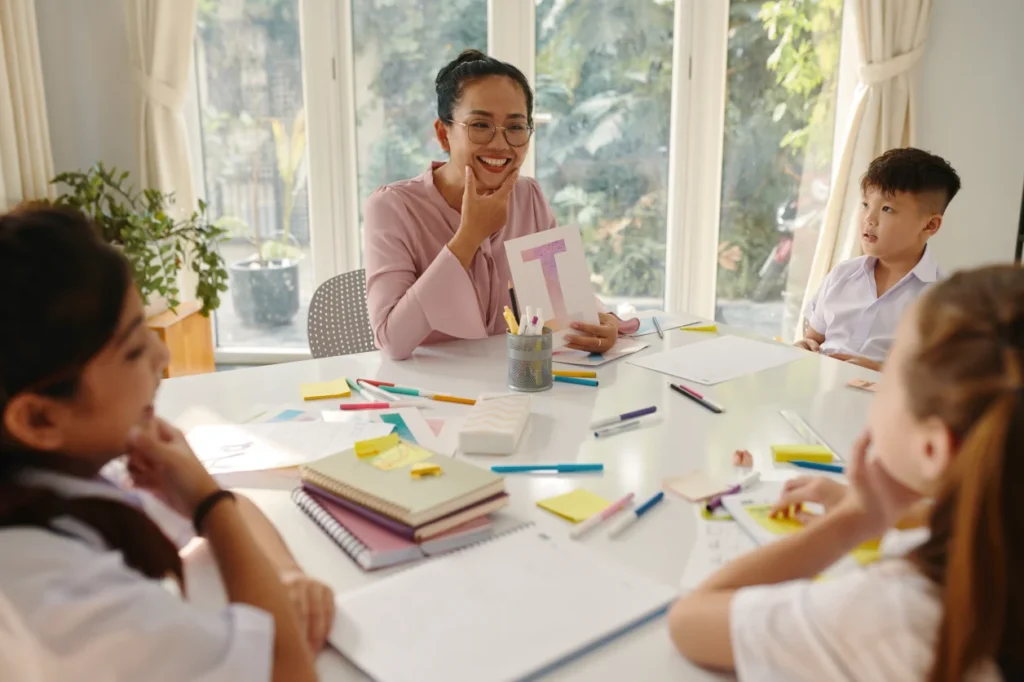Why the Trinity GESE Exam Works for All Ages
The Trinity GESE (Graded Examinations in Spoken English), developed by Trinity College London, is an internationally recognised qualification that focuses on real-life communication. Trinity is a respected UK exam board with a long history of evaluating English language skills globally.
The GESE exam is designed to develop and measure practical speaking and listening abilities, making it an excellent choice for both children and adults. By concentrating on spoken English, learners of all ages gain the confidence to express themselves clearly—a skill critical for academic, professional, and social success. Ready to take the next step? Learn more about the Trinity GESE exam via Trinity Exams Thailand.
Key Benefits of the Trinity GESE Exam
Speaking-Focused Approach
Trinity GESE is all about practical speaking and listening. The exam develops real-world communication skills, encouraging natural conversations and clear self-expression.
How It Helps Learners:
Encourages authentic communication in English.
Builds listening and responding skills essential for daily interactions.
Boosts confidence through one-to-one speaking tasks with an examiner.


Gradual Progression with 12 Levels
The Trinity GESE exam is divided into 12 grades across four stages, giving learners the opportunity to progress step by step and build confidence at their own pace. Each stage develops speaking and listening skills in a structured way, helping students communicate naturally in English.
The Four Stages Are:
Initial Stage (Grades 1–3): Build confidence with simple interactions, greetings, and everyday questions.
Elementary Stage (Grades 4–6): Develop more detailed conversations by sharing experiences, opinions, and ideas.
Intermediate Stage (Grades 7–9): Strengthen fluency and reasoning through discussions, problem-solving, and expressing viewpoints.
Advanced Stage (Grades 10–12): Achieve mastery by handling complex topics, abstract ideas, and extended discussions with confidence.
Personalised and Supportive
The one-to-one format of the Trinity GESE exam ensures every learner feels comfortable and supported. Examiners create a relaxed atmosphere, encouraging natural conversations and reducing stress. This approach helps candidates perform at their best and enjoy the experience.
How It Helps Learners:
Provides a calm, supportive setting that reduces anxiety.
Focuses on individual strengths and personal progress.
Delivers clear, constructive feedback to guide improvement.
Internationally Recognised
Trinity GESE certificates are respected worldwide and recognised by schools, universities, and employers. They give learners a sense of achievement and add real value to academic and professional portfolios.
Why It Matters for the Future:
Validates hard work and measurable progress in spoken English.
Boosts confidence to pursue higher studies, careers, or global opportunities.
Acts as a motivating milestone on the path to lifelong learning.

Engaging and Real-Life Topics
Trinity GESE exams are built around real-life, meaningful topics that make learning both enjoyable and practical. Each stage is designed to match the learner’s age and ability, ensuring preparation feels relevant, motivating, and confidence-building. Younger candidates explore everyday experiences, while advanced learners discuss more abstract and sophisticated issues.
Examples of Topics Covered:
Daily routines, hobbies, and favourite activities.
Family, friends, school, and community life.
Travel, technology, and global culture.
Dreams, ambitions, and aspirations for the future.
How We Teach the Trinity GESE Exam at ILC Hua Hin
At ILC Hua Hin, our teaching approach is designed to prepare learners for success in the Trinity GESE exam through structured, interactive methods. Every lesson focuses on spoken English, mirroring the real exam tasks so learners can practise authentic conversations with confidence.
Interactive Speaking Practice: Students work in pairs and groups, rehearsing the types of real-life dialogues they will face in the exam.
Step-by-Step Skills: Each stage of GESE is carefully broken down into manageable goals, helping learners build fluency gradually.
Personalised Feedback: Teachers give clear, constructive feedback after every activity so learners understand exactly how to improve.
Mock Exams: Regular practice exams recreate the real test environment, ensuring learners feel confident and prepared on exam day.

How We Prepare You for Trinity GESE
At ILC Hua Hin we train for GESE with a clear, practical plan:
Diagnostic check: short speaking interview to place you at the right grade and set targets.
Topic building: choose a personal topic and learn how to present it naturally and answer follow-ups.
Functions by grade: practise the language functions required at each grade (requesting, narrating, hypothesising, etc.).
Live practice: timed one-to-one drills that mirror the exam, with immediate, actionable feedback.
Mock exams: full run-throughs under examiner-style conditions so exam day feels familiar.
Admin support: help with dates, registration and materials.
Ready to start? How to Apply
What to Expect in the Trinity GESE Exam
GESE is a short, one-to-one speaking assessment that grows in complexity as grades increase. You’ll typically complete:
Conversation task: a natural chat about everyday life and interests to show real communication.
Candidate topic: present and discuss a topic you’ve prepared (higher grades develop it in more depth).
Interactive task (mid–high grades): react to a prompt or situation and keep the conversation going.
Listening & accuracy: demonstrate clear responses, appropriate vocabulary and control of the functions for your grade.
Certificates are awarded by Trinity College London and recognised internationally. See the official overview: Trinity GESE.
What You Study at Each GESE Stage

Initial Stage (Grades 1–3)
- Lays the foundation for clear, simple communication in English.
Learners practise introducing themselves, talking about family, pets, favourite things, and daily routines.
Focus on answering and asking basic questions such as “What is your name?” or “Where do you live?”.
Practice includes using numbers, colours, and time expressions in natural contexts.
Strong emphasis on correct pronunciation of high-frequency words and building listening skills.
Encourages confidence to speak English from the very beginning.
Teaching methods include songs, role-plays, and interactive games to make learning fun.
Learners practise handling short real-life exchanges such as shopping, greetings at school, or talking about the weather.
Builds early confidence and motivation that carry learners forward to the next stage.
See the official Trinity College London guide for Grades 1–3 here: Trinity GESE Grades 1–3 Guide.

Elementary Stage (Grades 4–6)
Expands vocabulary and moves beyond short answers into connected speech.
Learners describe hobbies, daily routines, school life, and favourite activities in detail.
Practice includes narrating events in the past (“Last weekend I…”) and making future plans (“Tomorrow I will…”).
Learners begin expressing preferences and simple opinions with reasons.
Stronger grammar patterns are introduced, such as comparatives and frequency expressions.
Focus on conversational turn-taking, with learners both asking and answering questions.
Teachers use role-plays such as shopping, ordering food, and planning outings.
Builds confidence to manage everyday social situations in English.
Prepares learners to move from memorised answers to natural conversation.
See the official Trinity College London guide for Grades 4–6 here: Trinity GESE Grades 4–6 Guide.

Intermediate Stage (Grades 7–9)
Learners begin to discuss more abstract and complex topics.
Subjects include travel, technology, education, culture, and social issues.
Practice includes explaining reasons, giving opinions, and supporting viewpoints.
Learners develop extended responses instead of short, basic answers.
Teachers introduce debates, group discussions, and problem-solving tasks.
Role-plays simulate real-life communication requiring flexibility and initiative.
Focus on active listening skills and responding naturally in unpredictable situations.
Builds confidence in leading conversations rather than simply answering.
Prepares learners for higher education, study abroad, or professional contexts.
See the official Trinity College London guide for Grades 7–9 here: Trinity GESE Grades 7–9 Guide.

Advanced Stage (Grades 10–12)
Designed for learners approaching near-native fluency in English.
Covers advanced topics such as culture, ethics, environment, and global issues.
Learners practise presenting structured arguments and analysing perspectives.
Focus on adapting language to both formal and informal contexts.
Teaching includes academic presentations, interviews, and debates.
Role-plays prepare learners for professional meetings and university settings.
Emphasis on critical thinking and negotiating meaning in English.
Learners refine fluency, accuracy, and advanced vocabulary use.
Achievement at this stage demonstrates mastery respected worldwide.
See the official Trinity College London guide for Grades 10–12 here: Trinity GESE Grades 10–12 Guide.
What Happens in Each Trinity GESE Exam
Initial Stage (Grades 1–3)
In the exam, learners introduce themselves and answer simple questions about their family, friends, favourite things, or daily life. They may be asked to name colours, numbers, or describe basic objects around them. Examiners prompt them with short questions like “What’s this?” or “Do you like apples?”, and learners show they can respond naturally. The focus is on confidence and clear pronunciation. Tasks include giving very short descriptions and handling predictable interactions such as greetings or classroom exchanges.
Elementary Stage (Grades 4–6)
At this stage, exam tasks move into longer conversations. Learners talk about personal interests, school life, hobbies, and everyday experiences. They are asked to describe pictures, talk about past activities (“What did you do last weekend?”), or explain simple future plans. Examiners encourage them to expand on their answers, ask for clarification, or express likes and dislikes with reasons. The exam often includes role-plays such as shopping, ordering food, or arranging a trip, where learners demonstrate they can use English to handle practical situations.
Intermediate Stage (Grades 7–9)
The exam now requires learners to discuss more abstract ideas. They take part in sustained conversations about topics like education, technology, or travel. Tasks include narrating a short story, describing processes, and giving opinions with reasons. Learners must respond to unexpected questions, justify their views, and interact naturally with the examiner in a back-and-forth exchange. Role-plays at this level are less scripted — for example, discussing a problem with a teacher or planning a group project. The examiner looks for logical organisation of ideas and the ability to maintain and lead a conversation.
Advanced Stage (Grades 10–12)
The exam at this level mirrors academic and professional communication. Learners prepare a short presentation on a chosen topic, such as cultural issues, environmental challenges, or global events, and then answer the examiner’s questions about it. They must also analyse and discuss complex themes, weighing different perspectives and negotiating meaning. The interaction tests their ability to argue a case, debate abstract ideas, and handle unpredictable turns in conversation. Candidates show near-native fluency by adapting tone and vocabulary for both formal and informal contexts, similar to what they would need in job interviews, university discussions, or international work settings.
Take the Trinity GESE Exam
Prove your speaking skills with Trinity GESE — an internationally recognised exam that builds confidence and fluency. How to Apply


